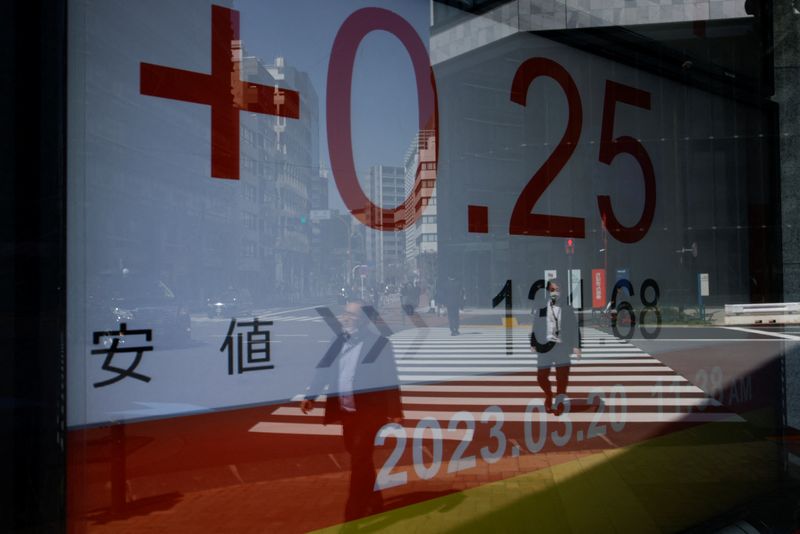By Caroline Valetkevitch
NEW YORK (Reuters) - Oil prices jumped more than 4%, gold gained and the safe-haven U.S. dollar edged up against the euro on Monday as military clashes between Israel and the Palestinian Islamist group Hamas fueled worries that the conflict could spread beyond Gaza.
U.S. stocks ended higher, with energy shares rising along with oil prices. The S&P 500 energy index ended up 3.5%.
Israel's shekel weakened sharply. The dollar was up about 3% at 3.955 shekels.
The Bank of Israel earlier said it would sell up to $30 billion of foreign currency to maintain stability. Israeli government bonds also fell.
The Israeli military said on Monday it had called up an unprecedented 300,000 reservists and was imposing a total blockade of the Gaza Strip, in a sign it may be planning a ground assault in response to the devastating weekend attack by the Hamas gunmen.
"Typically the most sensitive asset classes to geopolitical risk are emerging markets, commodities and currencies – and, true to form, we've seen hits in all of those areas," said Tina Fordham, geopolitical strategist and founder of Fordham Global Foresight.
"Wars are inflationary and wars in the Middle East especially are inflationary," she said.
Brent crude rose $3.57, or 4.2%, to settle at $88.15 a barrel, while U.S. West Texas Intermediate crude settled at $86.38 a barrel, up $3.59, or 4.3%.
Emerging market stocks lost 0.20%, while safe-haven gold was in demand, rising 1.6% to $1,860 an ounce.
On Wall Street, shares of U.S. airlines, hurt by rising oil prices, ended sharply lower. United Airlines, Delta Air Lines (NYSE:DAL) and American Airlines (NASDAQ:AAL) suspended direct flights to Tel Aviv.
Still, the Dow Jones Industrial Average rose 197.07 points, or 0.59%, to 33,604.65, the S&P 500 gained 27.16 points, or 0.63%, to 4,335.66 and the Nasdaq Composite added 52.90 points, or 0.39%, to 13,484.24.
The pan-European STOXX 600 index lost 0.26% and MSCI's gauge of stocks across the globe gained 0.40%.
"We don't see a 'sell now, ask questions later' market," said Quincy Krosby, chief global strategist at LPL Financial in Charlotte, North Carolina.
"The market at this point has focused on the diplomatic efforts to keep Israel focused on Hamas and reduce the prospect of escalation. There's an all-out global diplomatic effort to keep this conflict from expanding into the oil-rich region," she said.
Against the dollar, the euro fell 0.19% to $1.0566, while the dollar index, a measure of the U.S. currency against six others, retreated 0.16% after earlier trading higher.
The cash Treasury market was closed on Monday for Columbus Day. 10-year Treasury futures rose.
The conflict in the Middle East comes at a time when markets are jittery and bond yields around the world are at multi-year highs.

Investors are anxiously awaiting U.S. consumer price data, due later this week.
The unofficial kickoff of the third-quarter U.S. corporate earnings season is also this week, with J.P.Morgan and other banks due to report results.
